Finding the right water filter for your needs is a matter of knowing what’s available. Let’s compare popular and top-rated under counter water filters to one another.
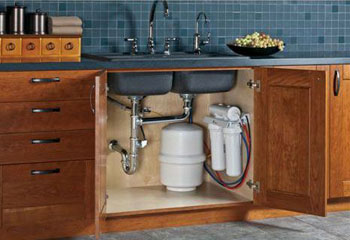
An under counter filter system is supplied directly from your homes cold water supply line that runs to your kitchen sink.
With a system that’s directly supplied by your house plumbing, you’ll never have to keep refilling a reservoir all the time, as with many countertop filters.
Yes, these systems will take a little bit more effort to set up, however, once installed, they are much more convenient and are more aesthetically pleasing than countertop water filters.
Two Types of Under Counter Water Filters:
There are basically two types of under counter filter systems, Reverse Osmosis and non-RO Filter systems. Let’s take a quick look at them here…
1). Reverse Osmosis Filter Systems:
Modern Reverse Osmosis Systems are truly amazing. RO is for people who want the cleanest water possible, filtering out the widest range of chemicals and other contaminants. If this is you, then Reverse osmosis is your best option.
If you’re interested in a Reverse Osmosis system, please visit our Reverse Osmosis page.
2). Non-RO Filter Systems:
Depending on how clean your water source is, you can find a system that’s especially made to filter the contaminants you want removed. If your water comes from a municipal source and you’re fairly confident in its quality, but you don’t like the chemical smells and taste of the chlorine they’ve added, then maybe a Non-RO system will satisfy your needs. A Non-RO system is generally less expensive than RO systems.
Non-RO filter systems can come as single, dual, or tri-cartridge filter system. Although they don’t have the filtering ability of RO systems, they are quite effective at filtering lead, chemicals, pathogens and other contaminants that cause foul tastes and odors. On the plus side, these Non-RO systems will not remove minerals from the water.
These are designed more for filtering municipal water, rather than for well water, but they can be very effective at reducing chemical pollutants from the water and last a few months before needing changing.
If you’re interested in a Non-RO system, please visit our Non-RO Water Filters page.
Comparison: Under Counter Filter Systems Vs. Countertop Water Filters
If you’re on the fence about whether to get a countertop filter, or an under the sink system, let’s take a quick look at the pros and cons of each type of filter system.
Clearly there are advantages and disadvantages for each type…
Under Counter Filter Systems:
Advantages:
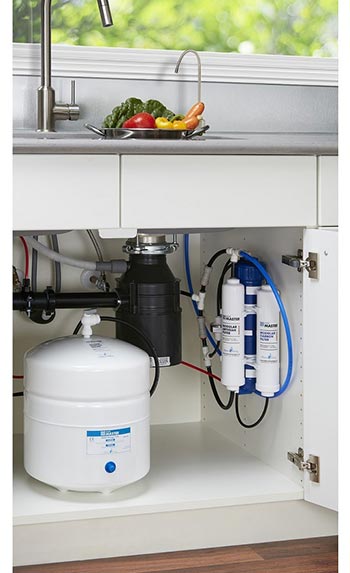
- Cutting-Edge technology provides excellent capability of removing a wide range of contaminants from your incoming water stream.
- Excellent flow rate – Because these systems are driven by the household water pressure, they have great flow rate.
- You can enjoy many months of drinking clean, purified water as easily as opening the dedicated tap.
- They don’t clutter your valuable counter space.
- Because it’s out of sight, you can maintain a pleasing, minimalist appearance of your kitchen. It won’t detract from the aesthetics of your kitchen.
- Under counter filter systems easily allow you to ‘T’ into them by adding a Refrigerator Kit that will supply your refrigerator and ice maker with filtered water, automatically! This eliminates the need to purchase and change out refrigerator filters. Imagine how convenient can be.
Disadvantages:
- Depending on the model, most under counter systems are pricier than most countertop models, but they are much more capable of removing contaminants.
- Although not difficult to install, they are a little more involved than countertop models. Luckily, once installed, you get to enjoy very long periods of maintenance-free usage.
- Access for filter changes will likely be tighter vs. countertop models.
Countertop Water Filters:
Advantages:
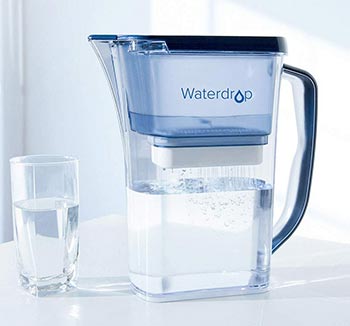
- Countertop filter systems are very fast to set up. You’ll practically pull it out of the box, wash it and be set up, filtering water in just a few short minutes.
- Many countertop filter models are small to a moderate size. The type that connects to the faucet spout and sits next to the sink, or the type that mounts directly on the faucet spout, and many of the pitcher-style filters are moderately sized and won’t take up too much space.
- Fresh filters are effective at removing chemical contaminants.
- Easy access for changing filters.
Disadvantages:
- You’ll feel like you’re always having to re-fill them. It become a chore.
- Although pitcher water filters are only moderate sized, the gravity-fed, tank-style filters like the Berkey’s and Zen are very large and would take up considerable space on your counter. Keep in mind that they may not fit underneath wall mounted cabinets.
- Gravity-fed filters, the ones that don’t connect to pressurized water, (i.e. pitcher filters and the tank-styled ones) are much slower to produce filtered water. When water is poured into the top, only the weak force of gravity causes it to trickle down through the filter. This takes much longer than pressurized systems. If there is a large demand in your house for filtered water, you may be waiting a long time for it.
- One more item on your counter can make it seem cluttered.
- More frequent filter changes.
Buyers Guide: Things to Consider When Selecting Your Filter System
Filtering Capacity
Generally speaking, the larger the physical size of a filter cartridge, the more filtering capacity it will have. This is just a general rule. There are many other factors that determine the ability of a filter to do its job of removing contaminants from drinking water. Quality varies dramatically between filter brands, which we will visit in the reviews.
Filters are engineered to specifically remove certain types of pollutants. Filters will separate contaminants either mechanically, or chemically.
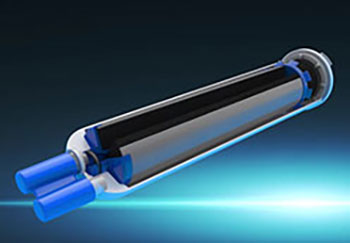
Mechanical filters will purify by forcing water through a porous filter material like spun nylon, or a synthetic foam material, or other types of spun fiber pads. These materials are very good at capturing larger particulates from the water like dirt and silt from the water.
A sediment filter is a very common mechanical filter. A Reverse Osmosis filter membrane is a very high-tech, mechanical type filter that is capable of removing contaminants on a far smaller, microscopic scale.
Chemical filters purifies water by capturing substances through a process of adsorption, as opposed to absorption. Absorption is when one material will soak up or entrap another material, as happens with most mechanical filters.
Adsorption is the process of capturing impurities and toxins with chemical bonds, binding to the filter material, as the water flows across the material and through the filter cartridge. This effectively pulls the contaminants from the water stream. An activated carbon filter is a good example of a chemical filter.
A filter system that incorporates several stages of both mechanical and chemical filtration will be more effective at purifying water.
Ease of Changing Filters
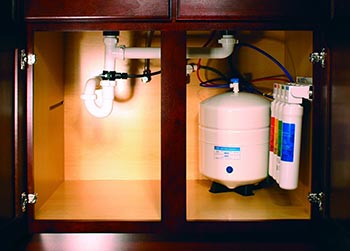
It’s important to consider the ease of changing out the filters. While under counter filters might be more convenient as far as usage and low maintenance, they might not be as easy to get access to when it’s time to change those filter cartridges. A filter system that’s installed in the cabinet under the kitchen sink is usually fairly cramped.
When I need to change out my filters in my RO system, I have to get on my hands and knees on the hard kitchen floor to do so. I’ll put down a folded up towel or something soft to kneel on. I then need to lean into the cabinet to reach the filters. A countertop system is easier to maintain, even if I had to change the filter(s) more frequently.
Filter Life Span
Under the counter filter systems have an advantage over countertop water filters in that the filters last for months. Under counter water filters are generally larger filters. This in itself will allow them to last longer than smaller, filters. This means you’ll enjoy the convenience of having pure water without the frequent maintenance of countertop type filters.
Amount of Waste Water Produced
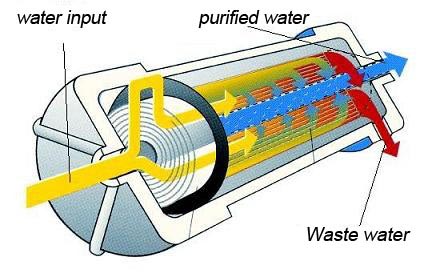
Reverse osmosis systems use a combination of mechanical and chemical filters, in addition to using the ultimate filtering ability of the RO membrane, to produce an unmatched filtering system.
However, with most RO systems, for every one gallon of water that’s filtered, four gallons of water are sent down the drain as “waste water”. Due to the concern of waste, some RO manufacturers have produced “Zero Waste RO” units. These zero-waste units, however, have proven to sometimes be problematic, as they can re-deliver concentrated waste water back into the incoming water stream that feeds the filter system.
A better solution offered by manufacturers, has been to offer an optional permeate pump that works with the RO System to reduce waste water by up to 80%. You’ll learn about this optional permeate pump in the reviews.
Delivery of Filtered Water
I’ve noticed some under counter filters are designed to filter ALL water that flows to the kitchen sink faucet.
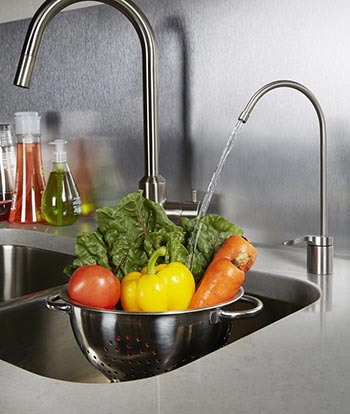
Like all under counter filters, they use the household’s cold water supply line as an supply input, but the out-flow side connects directly to your sinks main faucet. This means that all the cold water you draw from it is being filtered, whether you use it for drinking, cooking, doing the dishes, watering the plants, or for mopping the floor.
There may be a reason for you to want this type of filter, but realize that the filter will needlessly foul quicker with this type of set up.
In my opinion, it makes more sense to have a separate, point of use, dedicated tap, specifically used for consuming (drinking and cooking). This way you won’t foul the filter prematurely. Replacement filters cost money. There’s no good reason to use up the life of your filter if it’s not needed for drinking.
Under sink water filter systems will tee into the house supply line to feed the filter separately. The main kitchen faucet will still be supplied with unfiltered water, but he spliced line that feeds the filter will have a dedicated water tap that is to be mounted above the counter, near the main faucet. This way you only filter the water that you and your family will drink. Your point-of-use filter will last much longer.
If however, you’re looking for the most capable water filtering system to mount out of the way, under your kitchen sink, then you should consider installing a Reverse Osmosis System. RO systems are engineered to include several types of filter cartridges; each one specialized to eliminate specific contaminants from the water stream.
Conclusion
There are many factors to consider when deciding what water filter system will meet your family’s needs.
Countertop filters can be very easy to use and maintain, but you’ll need to constantly refill them, change their filters more often and deal with the space they take up.
Under counter filters have much longer life, are automatically supplied by the house plumbing, are out of site and more capable. Depending on which setup is used, they can waste some water. Because they’re mounted under the sink in tight spaces, they might not be as easy to change the filters.
If you’re looking for the most capable water filtering system and want it to mount it out of sight, then you should consider installing a Reverse Osmosis System. RO systems are engineered to utilize multiple filter cartridges; each one specialized to eliminate specific contaminants from the water stream. In combination, they are extremely effective in providing you with highly purified, healthy and delicious water.
Learn about the best under counter water filters:
- See the Best Residential Reverse Osmosis Systems
- strong>See the Best Under Counter Water Filters – Non-RO
